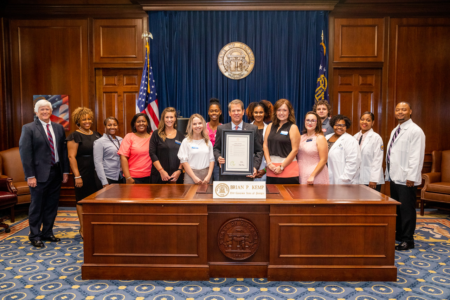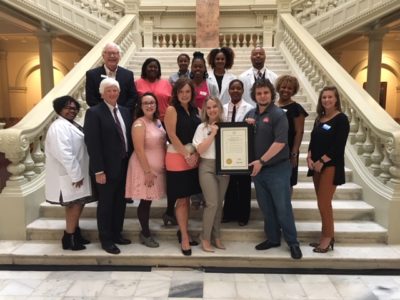Techs meet the guv’na, flu season starts, when shock treatment works, and more
12 Oct 2019
Posted by Andrew Kantor
Techs with the governor
Check it out: Members of GPhA’s Academy of Pharmacy Technicians’ — including APT board members — came to the Gold Dome to meet with Governor Kemp, who proclaimed October 15 to be Georgia Pharmacy Technician Appreciation Day!
Shock treatment
The first long-term results of implanted electrodes — designed to deliver mild electrical stimulation to fight depression — are in. In short: “About a third experienced full remission of symptoms in the months after surgery, and half reported measurable, noticeable reduction in their distress. They were doing just as well years later, the report found.” In long? Well, read the article.
Quick! It’s an Ebola test!
No more quarantining people who’ve visited Africa — the FDA has approved a rapid-diagnosis test for Ebola that “could help providers to more quickly isolate patients and begin treatments that can be potentially life-saving.”
New opioid withdrawal guidelines
With more people looking to break their opioid addictions, HHS has issued new guidelines for getting off. The gist: Cold turkey is bad. What’s of note is that earlier guidelines had physicians taking their patients off the pain-killers abruptly, which as you might imagine did not go well. Link goes to the news story, click here for the official HHS guidelines (PDF).
Great news about antibiotics
Half of people who are seen in outpatient settings get the correct recommended antibiotics. The other half? Not so much.
And so it begins
The flu season, that is. And this year’s winner for the first state to hit “moderate” activity? Let’s hear it for Louisiana. (On a scale of 1 to 10, with 10 being “we’re all gonna die,” Louisiana is already at a 7. Georgia and a handful of states are at 2; most of the nation is still at 1.)
Hypodermic needles are so 2019
MIT researchers have developed a drug capsule that can survive the stomach and then release its meds in the small intestine via microneedles.
In tests in pigs, the researchers showed that this capsule could load a comparable amount of insulin to that of an injection, enabling fast uptake into the bloodstream after the microneedles were released.
Elsewhere: Big Apple Edition
Pharmacists in New York can now “prescribe” fruits and vegetables to people with hypertension, and the state’s SNAP program will pay for them. Specifically, they can give patients with blood-pressure meds $30 per month in “Health Bucks” — paid by New York’s food stamp program — that can be used at farmers markets in the city.




